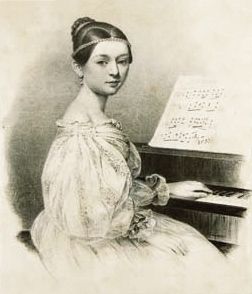
Clara Wieck in 1835
German pianist, teacher, and composer Clara Schumann (1819-1896) was born into a family of musicians. As such, she received an expert education in piano, violin, theory, harmony, orchestration, counterpoint, fugue, composition, religion, and languages from the most respected teachers in Leipzig, Dresden, and Berlin. She also attended every major performance in Leipzig and learned the business aspects of a successful musical career from her father and his musician colleagues.
A piano prodigy, Schumann gave her first performance at the Leipzig Gewandhaus at age nine, performed in Paris at twelve and Vienna at eighteen. Her musical connections and tremendous skills helped her to cross paths with the leading musicians of the day. She would continue to gain international acclaim as a concert pianist, giving extensive tours throughout Western Europe and Russia, even after marrying her husband, composer Robert Schumann.
During her long years of widowhood, Schumann continued to tour extensively, edited the authoritative Gesamtausgabe of her husband’s work, and became a principle teacher at the Hoch Conservatory in Frankfurt, where she taught until her death at the age of 76.
Although much of her work as a performer was aimed at championing her husband’s works, Clara was also a prolific composer. Her output includes a piano concerto, chamber music, solo piano works, and art songs.
Resources
Sources
Reich, Nancy B. “Schumann [née Wieck], Clara.” Grove Music Online. 2001.
Works Featured on Expanding the Music Theory Canon
Fuga I, Op. 16
Full Score
Page: Fugue
Fuga II, Op. 16
Full Score
Page: Fugue
Fuga III, Op. 16
Full Score
Page: Fugue